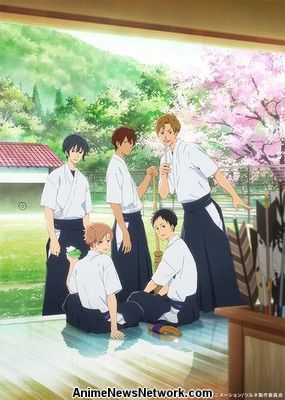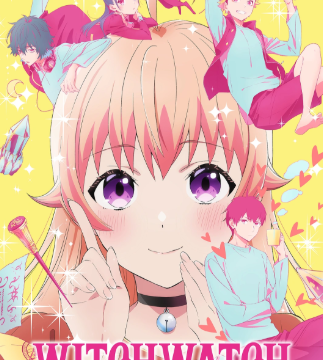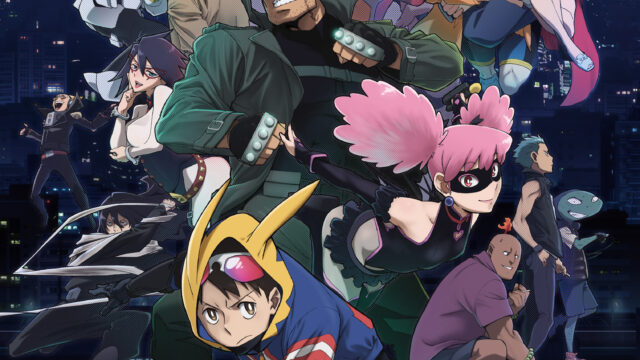English Dub Review: Tsurune “The Moment They Met”
The gang solves target panic.
Overview
In this episode, Minato goes back to the Kyudo club at school, apologizing for his previous outbursts and asks Tomi to formally join. Everyone welcomes him back with open arms, except for local anime bad boy, Kaito Onogi. Kaito resents Minato because he hates “flakes” and doesn’t respect people with wavering passion — especially towards Kyudo. Kaito’s hot-headed personality additionally managed to scare off all the potential new members — meaning the only ones left in the Kyudo club are the five main boys and the three side girl characters. Good boy Ryohei wants to make Minato as comfortable as possible at Kyudo club, so he secretly researches ways to solve target panic. While at the library, he meets a boy from another school who also practices Kyudo. He recommends a visit to the Nakazaki Kyudo Shop, where the owner gives Ryohei a written journal with target-panic-solving methods (on the condition that Ryohei buys all his Kyudo merch from that shop for the rest of his high school career.)
While tensions are rising between Kaito and Minato at the club, Ryohei confesses to Nanao that he looked up to Minato as a childhood hero, and wants everyone to get along. Nanao and Ryohei then devise a coloring-book plan to push Kaito and Minato together as friends. They figure if Kaito sees Minato at the club practicing early in the morning, Minato would earn Kaito’s respect as an archer. However, the plan backfires when the entire club coincidentally shows up early, and they all accidentally eavesdrop on a conversation Minato and Seiya are having in the dojo. Seiya asks Minato why he came back to the Kyudo Club, and Minato gives a heartfelt speech about putting his passion for Kyudo before his pride (without mentioning Masaki’s influence.)
Kaito isn’t moved by Minato’s words until Ryohei convinces him of Minato’s capability. Kaito still distrusts Minato, but agrees to accept him on behalf of Ryohei’s passion for his friend. From here, the boys are officially a team for the upcoming competitions. As an end-of-episode twist, Tomi reveals a certain individual will be helping the Kyudo club practice — and that someone is Masaki (who Kaito seems to know as well as Minato.)
It’s then revealed that the boy who helped Ryohei is on a team that may compete against them — with a mysteriously skilled archer on their side.
Our Take
There was definitely a push to expand on personality in this episode — different values are shown by the main five, but especially so by Ryohei and Kaito. Ryohei values friendship and embraces the differences of others, while Kaito values dependability and passion similar to himself, choosing to stay distant towards people until they earn his respect. Minato got a bit of character development since last episode, thanks to Masaki, and it showed through Minato’s efforts to overcome his target panic.
Speaking of target panic — we finally got a dictionary definition for what exactly “target panic” is. From episode one, the characters talk about target panic as if it’s something that everyone magically, universally knows. By context clues, we can infer that target panic is basically the archery equivalent of stage fright, but the mere mention of target panic as a textbook term in every episode seemed almost as if it were a made up conflict (and term.) Target panic, “refers to when an archer shoots their arrows early, regardless of their intention,” which would have been nice to know a little earlier. Perhaps there’s an assumption that Tsurune’s audience is full of archers, but either way, the entire focus of “target panic” as a main conflict still comes across as kind of boring. The stakes (and visual/audio stimulants) need to be raised for the audience to truly feel the panic in “target panic.”
There’s a small battle to be waged with the animation, the voice acting, and the dialogue — specifically, when it comes to which aspect is to be blamed for each other’s downfall. The animation is pretty generic, which may be the reason the voice acting performances are lackluster — but, the voice acting performances could simply be lacking on behalf of the dialogue/story quality itself. Many lines in the episode felt as though they were sentences written by someone who was writing an anime parody. Meaning, they were either so stereo-typically “something an anime character would say,” or that they sounded the way someone impersonating a character archetype might sound like.
Tsurune’s main problems thus far all stem from the fact that a few major key storytelling elements are generally unimaginative. The character motives are predictable, the personalities are predictable — even the dialogue is predictable. However, with current developments happening on the individual characters, the episode gives way for the audience to start warming up to its story, too.

























"There are also other characters that come and go (also owned by the Warner Bros. Discovery conglomerate media company)."
Huh. Is that just referring to other characters from the show itself, or is this implying that the new season is going to have cameos from other WBD IPs